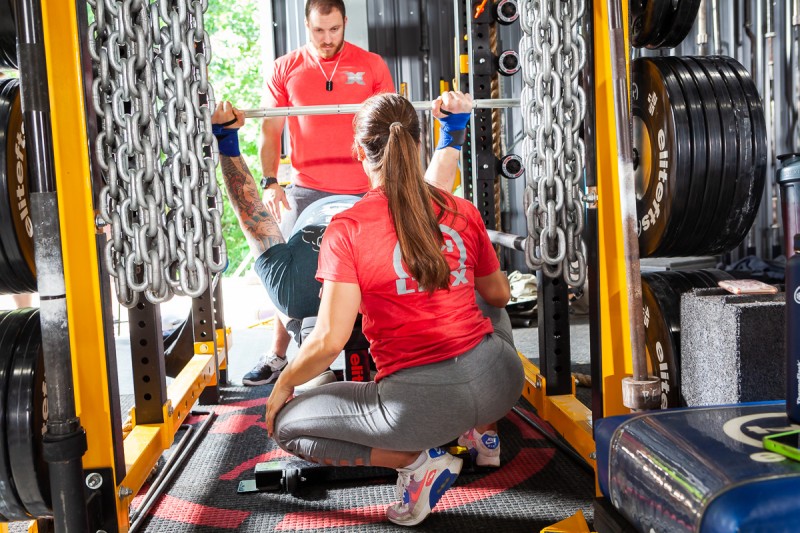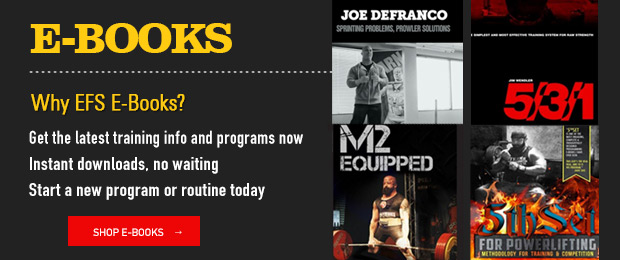
As strength professionals, we all should have read Start with Why by Simone Sinek. If you haven't read this book, read it, even though you should've started it yesterday. This book haunts me and reminds me almost daily to remain focused on the end game.
I was reminded of this book the other day when a former assistant (and good friend) called me to tell me about some issues he was having at work. He feels as though his boss is always just trying to save his job.
RECENT: The Two Variables That Change It All: Load and Speed
For those of you who have never experienced this, it's pretty normal in our profession. This is when a strength coach feels pressure from a head coach or the administration about his job and tries to do everything “right,” or how the coach wants it done so that he won't get fired.
Well, here is the hard part: we will all get fired. Coach long enough, and you, too, will get fired. The reality is we work in a process-based profession in an instant gratification culture. If you don’t believe this, go to any national conference and ask who has been employed at their current school for more than five years? Ten years is almost unheard of! So always start with your why.
Define Your Why
How many of us have yet to define this? Too often, the mistake I see in the profession is that our why is to make a head coach happy. Mark Watts said this years ago, and he was a better coach when he quit trying to make his coaches happy. The reality is too often we are interested in making head coaches happy at the expense of ourselves, our families, and our future careers. I have no doubt that these next few paragraphs will ruffle some feathers, but I believe it needs to be said.

My why is to improve the student through and of the human body and mind. There is a multitude of ways that this end goal can be accomplished. I can give my athletes a well-thought-out program to make them faster, stronger, and more resilient. I won't be their massage therapist, personal chef, or maid.
I've been seeing more and more strength coaches doing things that I would consider out of our scope of practice. We aren't physical therapists. If my goal is to improve my athletes, I should be spending time doing what I do best — educating and training. We also aren't chefs, so why should I commit my time to shopping and making food for my athletes? These are examples of pleasing a head coach, not improving the athlete. Remember, when you commit your time to any chore for the student, you have set a standard that you must always live up to, so be careful with your new responsibilities.
If your why is chasing numbers... good luck. I forget where I read it, but there was an article that talked about how football has hurt strength and conditioning more than it has helped it. I can see the point of the article, even if I'm not sure I agree.
The chasing numbers coach isn’t just a football problem, but football seems to accentuate the issue. I know I've sat in more meetings than I can count where a football coach has said to me that we need to have our linemen all benching 405 pounds. I agree that 405 pounds is a cool number to bench, but where in the world does it state that a 405-pound bench equals a good lineman?
If you find yourself in a situation where all you're doing is chasing numbers, I highly recommend that you either find a new job or find a supportive administration. Too often, I made the mistake of trying to make this work. I promise you that once the numbers game begins, you'll lose. I've seen athletes go from a 225-pound bench as a freshman to a 405-pound bench as a senior, and it still wasn’t enough, so forget chasing numbers.
RELATED: Is Your Foundation Made of Rock or Sand?
If your why is better movement quality... good luck. I was once asked if I was a “movement guy.” I still don't have any clue what this means. I think it has something to do with the functional movement screen, but I'm still not sure if that’s it. I’ll be the first to admit that I loathe using vipers in my lifts and won’t do it, but I have great friends who have found success doing just that. If you're a “movement guy" (or gal), be sure to follow Nate Harvey and don't forget about strength because I know many weak people who can do a full squat without any issues but can’t handle speed or load with that movement.
Now that I've insulted everyone out there and what they do, here's how can you can live and coach your why. As stated earlier, my why is to improve the student through and of the human body. It took me years to come up with this, and after many iterations later, I think I have a somewhat finished product.
However, my why is weak because it doesn't have any metrics with which to score it to determine whether or not it's working. This is one of the issues that will always exist in our profession. We can't define success. If winning games is the goal, find out what Alabama is doing (recruiting great players). If graduating students is the goal, call West Point (they recruit the best students). This is why we must meet our students where they are right now.
Define your success by asking all of these questions. Did the athletes' numbers improve (but don’t be a numbers chaser)? Did their movement improve (but don’t make this appear as the only metric)? Ask your students one year, five years, and ten years after they graduate what they learned. Use the student as the metric.
While writing this, an interesting thing happened. A few athletes contacted me because they were recently asked to donate to the school where they used to play. This is another metric that you can use. Are your students lining up to donate back to help make your program better?










